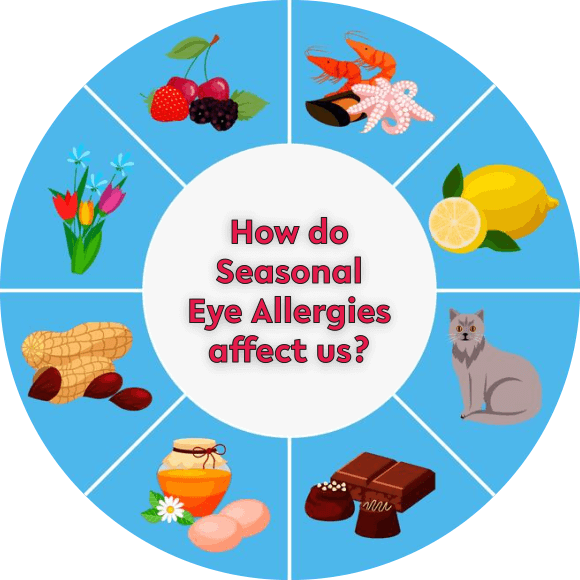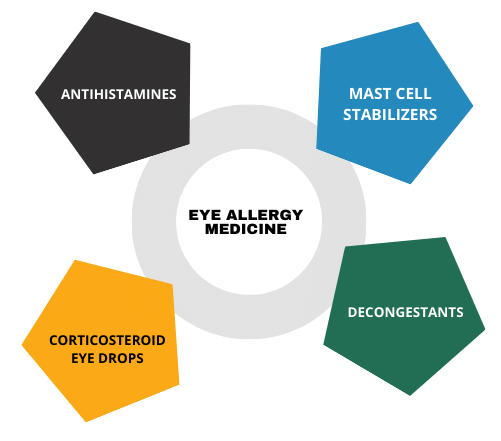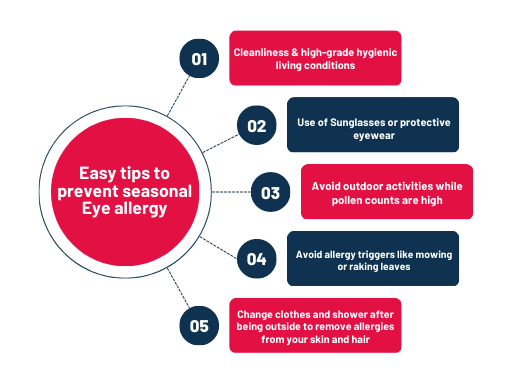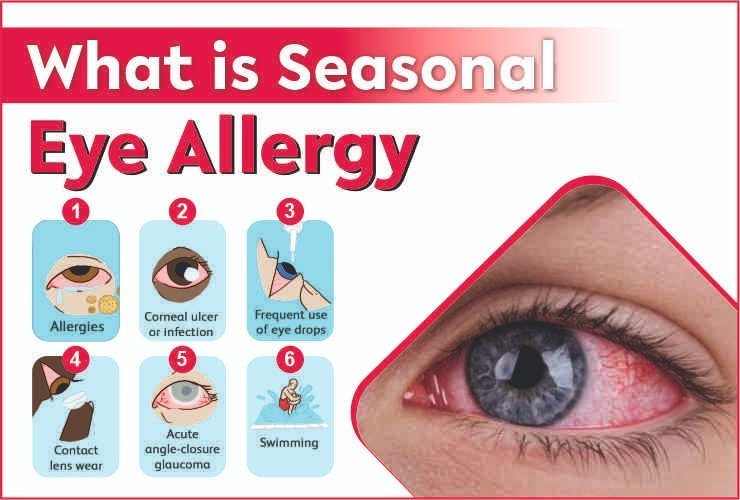Also referred to as allergic conjunctivitis, seasonal eye allergies are quite a common eye condition that occurs when the eyes come into contact with allergens (foreign particles) such as pollen, grass, foreign particles, or mold.
How do seasonal eye allergies affect us? Seasonal eye allergens cause an immune response in the body, resulting in symptoms such as itching, redness, watery eyes, and puffiness.

Treatment of seasonal eye allergies?
Prevention is better than cure: The most effective treatment for seasonal eye allergies is to avoid the allergens that cause your symptoms. This may involve staying indoors on high pollen days, keeping windows and doors closed, and using air filters to purify the air. It’s also a good idea to shower and change clothes after spending time outdoors to remove any allergens that may be on your skin or clothing.
Treatment for Eye allergy – Eye Allergy medicine: These days, several over-the-counter and prescription medications are available to help relieve seasonal eye allergy symptoms. These include:
- Antihistamines: such medications block the action of histamine, a chemical released in our body during an allergic reaction. They can help to reduce itching, redness, and watery eyes.
- Mast cell stabilizers: These medications prevent the release of histamine & several inflammatory chemicals from cells into the eyes. They are often used as a preventive treatment for seasonal eye allergies.
- Decongestants: These medications help to reduce redness and puffiness in the eyes by constricting the blood vessels in the eye.
- Corticosteroid eye drops: These medications are a type of anti-inflammatory drug that can be used to reduce swelling and itching in the eyes.

If you’re experiencing severe or persistent symptoms of seasonal eye allergies ( Chronic Eye Allergy); In that case, it’s a good idea to consult a qualified Eye specialist to pin down the cause & decide on the treatment thereof. Combined with your observations & experiences, the specific allergens can be traced on a case & case basis, and accordingly, treatments are planned. Please note that you should consult a qualified eye specialist for any treatment of chronic eye allergies.
Easy tips to prevent seasonal Eye allergy ( Eye Allergy Relief & Management)
- Cleanliness & high-grade hygienic living conditions: A significant way to manage seasonal eye allergies is by keeping your living space as sterile and clean as possible, especially during allergy season. This could be done by regularly vacuuming, dusting, and keeping mold at bay. In addition, it’s vital to keep an eye on the pollen count and climate, so you know when it’s best to stay indoors.
- Use of Sunglasses or protective eyewear. Another way to reduce exposure to allergens is to wear sunglasses outdoors, especially on windy days. This can help to keep pollen and other allergens out of your eyes.
- Avoid outdoor activities while pollen counts are high.
- Stay indoors during high pollen times, usually early morning and late afternoon.
- Close windows: Close home and automobile windows to keep allergens out. Air-conditioning filters indoor air.
- Change clothes and shower after being outside to remove allergies from your skin and hair.
- Maintain: Dust and vacuum often to reduce allergies. Hot-water-wash bedding, curtains, and other delicate surfaces weekly.
- Avoid allergy triggers like mowing or raking leaves.

If your symptoms are particularly severe, your eye doctor may also recommend using a combination of treatments, such as taking an antihistamine tablet and anti-inflammatory eye drops. In addition, in specific cases, immunotherapy (allergy shots) may be recommended as a long-term solution for people with severe or persistent symptoms that are not well controlled with other treatments.
Eye allergy Home Remedy
Several time-tested home remedies may help alleviate an eye allergy’s symptoms. Some of the most commonly recommended treatments include:
Cold compresses: Placing a cold, damp cloth over your closed eyes can help reduce inflammation and itching.
Rinsing your eyes: Use a saline solution to rinse your eyes, which can help flush out any allergens that may be irritating.
Applying honey or aloe vera: Honey is a natural anti-inflammatory and can help soothe the skin, while aloe vera is also known for its anti-inflammatory properties.
How long does seasonal eye allergy last?
Seasonal eye allergies, also known as allergic conjunctivitis, can last from a couple of days to several weeks, given the severity of the allergy and the person. The symptoms of seasonal eye allergies can also vary in severity from person to person. For example, some people may only experience mild symptoms, such as itchy eyes, while others may have more severe symptoms, such as red, swollen eyes and excessive tearing.
The duration of seasonal eye allergies also depends on the specific allergen causing the reaction. For example, seasonal allergies caused by tree pollen may last for several weeks during the spring, while seasonal allergies caused by grass pollen may last for several weeks during the summer.
Overall, the length of time that seasonal eye allergies last can vary depending on the person and the specific allergen.
Not one treatment or prevention tip works for all seasonal eye allergies!
It’s important to note that everyone’s experience with allergies is different, so what works for one person may not work for another. Be patient, and don’t be afraid to try other treatments or ask your eye doctor for guidance. Finding the right treatment plan for you can help alleviate the symptoms of your seasonal eye allergies and allow you to enjoy the beauty of all seasons of the year.
Also, read our blog on how to Boost Your Eye Health
Video tutorial with an easy tip to manage seasonal eye allergy

